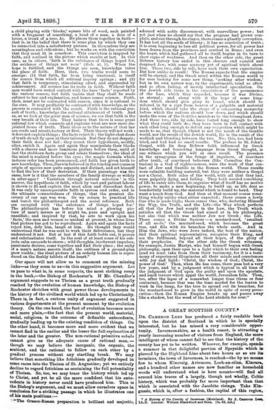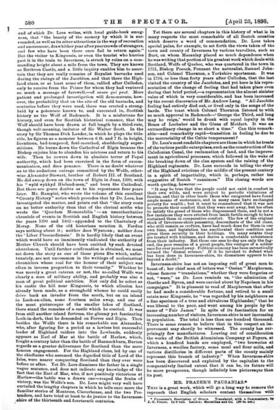A GREAT SCOTTISH COUNTY.•
Du. CAMERON LEES has produced a fairly readable book upon the district of Scotland in which he is specially interested, but he has missed a very considerable oppor- tunity. Inverness-shire, as a health resort, is attracting a yearly increasing number of visitors from England, the more intelligent of whom cannot fail to see that the history of the county has yet to be written. Whoever, for example, spends a summer in that delightful portion of Speyside which is pierced by the Highland Line about two hours or so ere its terminus, the town of Inverness, is reached—the by no means few to whom Kincraig, Aviemore, Loch-an-eilan, Kinrara, and a hundred other names are now familiar as household words will understand what is here meant—will find all around him traces of a largely, though not wholly, Celtic history, which was probably far more important than that which is associated with the Jacobite risings. Take Kin- gussie, which is, after a fashion, the capital of this region, • A History of the County of Inverness (Mainland). By 3, Cameron Leos LLD. London: William Blackwood and Bona, 17e. 6d. neta and of which Dr. Lees writes, with local guide-book smug- ness, that " the beauty of the scenery by which it is sur- rounded, as well as its other attractions in the way of recreation and amusement, draw hither year of ter year crowds of strangers, and few who have been there once fail to return again." But the visitor to Kingussie, or even the tourist who hurries past it in the train to Inverness, is struck by rains on a com- manding height about a mile from the town. They are known as Ruthven Castle, and a little inquiry enables him to ascer- tain that they are really remains of Royalist barracks used during the risings of the Jacobites, and that there the High- land clans, or at least some of them, rallied after Culloden, only to receive from the Prince for whom they bad ventured eo much a message of farewell,—of sauve qui pet& More patient and prolonged investigation will demonstrate, how- ever, the probability that on the site of the old barracks, and centuries before they were used, there was erected a strong- hold by a potentate known to, and execrated in, Scottish history as the Wolf of Badenoch. It is a misfortune for history, and even for Scottish historical romance, that the Wolf should have been drawn at full length by a third-rate, though well-meaning, imitator of Sir Walter Scott. In the story by Sir Thomas Dick Lauder, in which he plays the title- role, he figures as a monster between 6 ft. and 7 ft. in height, licentious, bad-tempered, foul-mouthed, shudderingly super- stitious. He burns down the Cathedral of Elgin because the Bishop enjoins him to abandon his mistress and return to his 'wife. Then he cowers down in absolute terror of Papal authority, which had been exercised in the form of excom- munication, and does penance. There is no doubt whatever as to the audacious outrage committed by the Wolfe, other- wise Alexander Stewart, brother of Robert III. of Scotland. He did swoop down on the town of Elgin in June, 1390, with his " wyld wykkyd Hieland-men," and burn the Cathedral. But there are grave doubts as to his repentance four years later. Mr. Rampini, who wrote the volume of this excellent "County History" series which precedes that by Dr. Lees, has investigated the matter, and points out that " the story rests on no better authority than that of the clerical scribe who wrote the Qumdam Memorabilia ' — an unauthoritative chronicle of events in Scottish and English history between the years 1390 and 140.2—appended to the Chartulary of Moray. None of the old historians mention it. Fordun says nothing about it ; neither does Wyntoun ; neither does the Liber Pluscardiensis.' It is hardly likely that an event which would have so imminently vindicated the authority of Mother Church should have been omitted by such devoted churchmen. Until further confirmation is obtained, we must set down the story as one of those pious fibs which, unfor- tenately, are not uncommon in the writings of ecclesiastical chroniclers whose zeal for the honour of their subject was often in inverse proportion to their veracity." Whether he was merely a great cateran or not, the so-called Wolfe was clearly a man of military ability, and probably was also a man of great political ambition. Not only did he select as his castle the hill near Kingussie, to which allusion has already been made, as a stronghold whence he could easily drive back an invader from the south, but on an island in Loch-an-eilan, some fourteen miles away, and one of the most picturesque of the smaller lakes of Scotland, there stand the remains of a castle which he erected. It was from still another island fortress, the gloomy yet fascinating Lech.in-dorb, that he descended on Forres and Elgin. Then besides the Wolfe there is his remarkable son Alexander, who, after figuring for a period as a lawless but successful leader of Highland raiders into the Lowlands, suddenly appears as Earl of Mar at the battle of Harlem, which, fought a century later than the battle of Bannockburn, Barton regards as a greater deliverance for Scotland than the more famous engagement. For the Highland clans, led by one of the chieftains who assumed the dignified title of Lord of the Isles, were nearer conquering Scotland than they ever were before or after. Yet Dr. Lees dismisses the father in a single vague sentence, and does not indicate any knowledge of the fact that the Earl of Mar, who, if not positively victorious at Harlaw—the battle was a drawn one—reaped the fruits of victory, was the Wolfe's son. Dr. Lees might very well have curtailed the lengthy chapters in which he tells once more the familiar stories of Montrose, Claverhonse, and the two Pre- tenders, and have tried at least to do justice to the Inverness- shire of the thirteenth and fourteenth centuries.
Yet there are several chapters in this history of what is in many respects the most remarkable of all Scotch counties which deserve a word of commendation. Dr. Lees takes special pains, for example, to set forth the views taken of the town and county of Inverness by various travellers, such as Burt, on whom Macaulay placed so much dependence when he was writing that portion of his greatest work which deals with Scotland, Wolfe of Quebec, who was quartered in the town in 1751, Bishop Pocock, Pennant the naturalist, Samuel John- son, and Colonel Thornton, a Yorkshire sportsman. It was in 1784, or less than forty years after Culloden, that the last visited the country of the Jacobites, and yet here is his repre- sentation of the change of feeling that had taken place even during that brief period,—a representation the almost sinister value of which is very considerable, and has been increased by the recent discoveries of Mr. Andrew Lang. " All Jacobite feeling had entirely died out, or lived only in the songs of the bards. The toast which Colonel Thornton listened to with so much approval in Badenoch—' George the Third, and long may he reign,' would be drunk with equal loyalty in the Braes of Lochaber and the Glens of Moidart. It was an extraordinary change in so short a time." Can this remark- able—and remarkably rapid—transition in feeling be due to the mercuriality of the Celtic temperament ?
Dr. Lees's most readable chapters are those in which he treats of the various pacific enterprises, such as the construction of the Caledonian Canal, the reclamation of land, and the improve.
ment in agricultural processes, which followed in the wake of the breaking down of the clan system and the raising of the Highland regiments. Dr. Lees succeeds in telling the story of the Highland evictions of the middle of the present century in a spirit of impartiality, which is, perhaps, rather too suggestive of Scotch "canniness." His closing words are
worth quoting, however :-
" It may be true that the people could not exist in comfort in their own wilds, and were subject to periodic visitations of famine, and that in other lands those who emigrated have found ample means of sustenance, and in many cases have exchanged poverty for wealth ; but it must be remembered that it was not to promote their comfort that they were sent away, but too often to satisfy the greed of those who dispossessed them, and in not a few instances they were evicted from lands fertile enough to have sustained them in comparative comfort. The few of the original stock of Inverness-shire peasantry, descendants of the old clans, who still remain as crofters, have had much done for them in our own time, and legislation has ameliorated their condition and given them security in their holdings. On many estates they are treated with kindness, and derive a comfortable subsistence from their industry. But those one sees to-day are only the fag- end, the poor remains of a great people, the vestiges of a soldier race for ever passed away. Political economy has been sarcastically termed the ' dismal science.' If it be invoked to defend what has been done in Inverness-shire, its dismalness appears to be beyond a doubt."
Inverness-shire has not an imposing roll of great men to boast of ; her chief man of letters was " Ossian " Macpherson, whose famous " translations," whether they were forgeries or not, "were," as Dr. Lees reminds us, the admiration of Goethe and Byron, and were carried about by Napoleon in his campaigns." It is pleasant to read of Macpherson that after he had made a considerable fortune, and retired to a small estate near Kingussie, he " was regarded by his neighbours as a fine specimen of a true and chivalrous Highlander," that he was liberal to the poor, and went among his people by the name of " Fair James." In spite of its fascination for an increasing number of visitors, Inverness-shire is not increasing in population. The total is less than one hundred thousand. There is some reason to believe that in this respect an im- provement may shortly be witnessed. The county has sur- prisingly few manufactures. Leaving out of consideration the works of the British Aluminium Company at Foyers, at which a hundred hands are employed, " two breweries at Inverness, a woollen factory, some meal and flour mills, and various distilleries in different parts of the county mainly represent this branch of industry." When Inverness-shire has been discovered and exploited by the capitalist to the comparatively limited extent that it can be, its future will be more prosperous, though infinitely leas picturesque than its past.



































 Previous page
Previous page